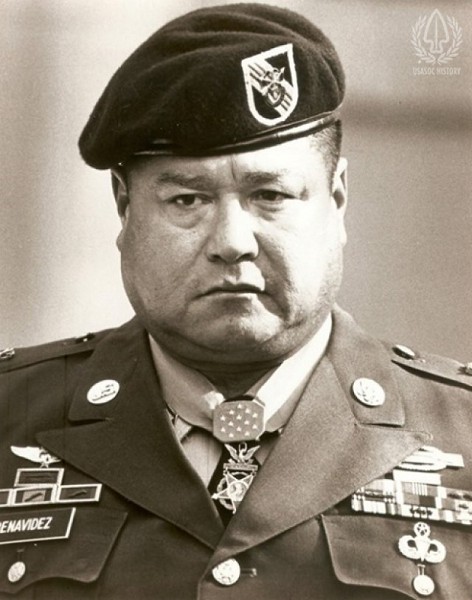SPECIAL FORCES SOLDIER VOLUNTARILY RISKS HIS LIFE TO SAVE OTHERS
 MSgt. Roy P. Benavidez of the Army’s 5th Special Forces Group was awarded the Medal of Honor for voluntarily risking his life to save his fellow soldiers during the Viet Nam War. He was presented the Medal of Honor by President Ronald Reagan in 1981. The U.S. Navy commissioned a ship in his honor, the USNS Benavidez, in 2003.
MSgt. Roy P. Benavidez of the Army’s 5th Special Forces Group was awarded the Medal of Honor for voluntarily risking his life to save his fellow soldiers during the Viet Nam War. He was presented the Medal of Honor by President Ronald Reagan in 1981. The U.S. Navy commissioned a ship in his honor, the USNS Benavidez, in 2003.
“Greater love hath no man than this, that a man lay down his life for his friends.”
John 15:13 King James Bible.
It was just past dawn on May 2, 1968, during the height of the Viet Nam War when a 12-man Special Forces Team was inserted by helicopter into dense jungle to gather intelligence on enemy activity. It was a day that would change the life of Army Master Sergeant (Staff Sergeant at the time) Roy P. Benavidez forever and earn him the Medal of Honor.
After a short period on the ground, the Special Forces Team ran into heavy enemy resistance, taking numerous casualties and requesting extraction by helicopter. Three choppers attempted to rescue the men but were unsuccessful due to intense small arms and anti-aircraft fire.
SSgt. Benavidez, assigned to the 5th Special Forces Group (Airborne), was monitoring the situation by radio when one of the helicopters landed to off-load their wounded. SSgt. Benavidez voluntarily boarded a returning aircraft to assist in yet another rescue attempt totally disregarding the danger to himself.
His Medal of Honor citation reads: “Realizing that all the team members were either dead or wounded and unable to move to the pickup zone, Benavidez directed the aircraft to a nearby clearing where he jumped from the hovering helicopter and ran approximately 75 meters under withering small-arms fire to the crippled team. Prior to reaching the team's position, he was wounded in his right leg, face, and head. Despite these painful injuries, he took charge, repositioning the team members and directing their fire to facilitate the landing of the extraction aircraft and the loading of the wounded and dead team members.
He then threw smoke canisters to direct the aircraft to the team's position and, despite his severe wounds, he dragged half of the wounded team members to the awaiting aircraft. He then provided protective fire by running alongside the aircraft as it moved to pick up the remaining team members. As the enemy's fire intensified, he hurried to recover the body and classified documents on the dead team leader.
When he reached the leader's body, Sgt. Benavidez was severely wounded by small-arms fire in the abdomen and grenade fragments in his back. At nearly the same moment, the aircraft pilot was mortally wounded, and his helicopter crashed. Although in extremely critical condition Sgt. Benavidez secured the classified documents and made his way back to the wreckage, where he aided the wounded from the overturned aircraft and gathered the stunned survivors into a defensive perimeter.
SSgt. Benavidez began calling in tactical air strikes and directed fire from supporting gunships to suppress the enemy to permit another extraction attempt. On his second trip with the wounded, he was clubbed from additional wounds to his head and arms before killing his adversary. He continued under devastating fire to carry the wounded to the helicopter. Upon reaching the aircraft, he spotted and killed two enemy soldiers who were rushing the craft from an angle that prevented the aircraft door-gunner from firing upon them. With little strength remaining, he made one last trip to the perimeter to ensure that all classified material had been collected or destroyed and to bring in the remaining wounded. Only then, in extremely serious condition from numerous wounds and weak from a loss of blood did he allow himself to be pulled into the extraction aircraft.”
When it was all over, Benavidez suffered a broken jaw and 37 bullet and bayonet puncture wounds.
Sgt. Benavidez' choice to voluntarily expose himself to enemy fire resulted in saving the lives of at least eight men. He was presented the Medal of Honor by President Ronald Reagan in 1981. The U.S. Navy commissioned a ship in his honor, the USNS Benavidez, in 2003.
Reading these accounts of American bravery and self-sacrifice warms the hearts of patriotic citizens everywhere. Our servicemembers today stand ready to risk their lives to protect our nation and we should do all we can to support them and their families. That is where Support Our Troops comes in.
Please consider showing your support for today’s servicemembers deployed overseas by contributing funds to Support Our Troops’ Patriot Brigade®. Here you will join thousands of patriots who make monthly donations to improve the lives of our servicemembers and their families. Please go to our secure website https://supportourtroops.org/donate to contribute to America’s finest today!


